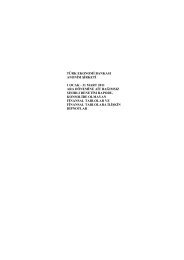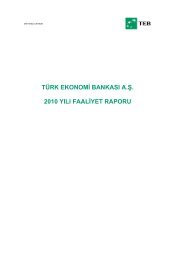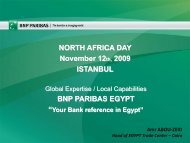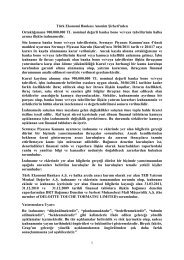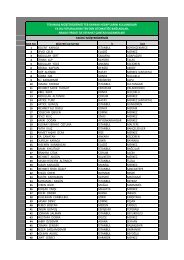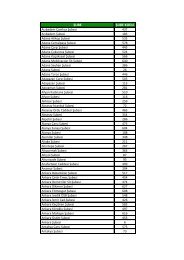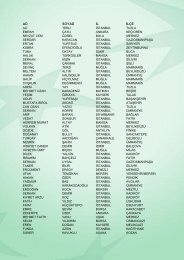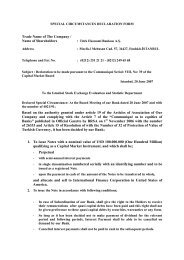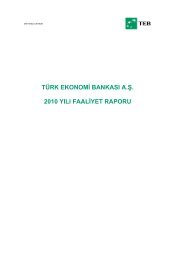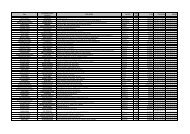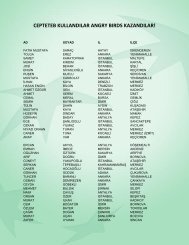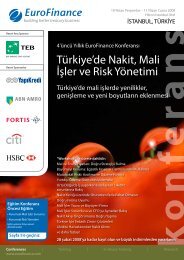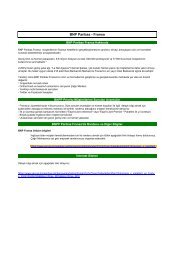Credit Opinion: Turk Ekonomi Bankasi AS - Teb.com
Credit Opinion: Turk Ekonomi Bankasi AS - Teb.com
Credit Opinion: Turk Ekonomi Bankasi AS - Teb.com
Create successful ePaper yourself
Turn your PDF publications into a flip-book with our unique Google optimized e-Paper software.
However, the bank's lower capital quality will likely affect its capacity to retain earnings for future capital growthdue to the <strong>com</strong>paratively higher cost of capital for its mixed capital, consisting of equity and subordinated debt<strong>com</strong>ponents. This places the bank at a disadvantage to some of its peers that have more leeway for future growthand market share expansion. We believe that the bank's future internal capital generation will be key in keepingpace with the continued strong growth in the system. We acknowledge shareholders' <strong>com</strong>mitment to supportingthe bank's adequate capitalisation and growth prospects.MODERATE <strong>AS</strong>SET QUALITY WHICH IS IN LINE WITH THAT OF THE BANKING SYSTEMCompared with other <strong>Turk</strong>ish banks, TEB has greater exposure to an economic slowdown because of its SMEand unsecured retail loan exposure - which we view as more vulnerable to economic swings - <strong>com</strong>prising around46% of its total performing loans <strong>com</strong>pared with a system average of around 25% as of half-year 2013.As of half-year 2013, TEB reported a non-performing loan (NPL) ratio of 2.1% (2.3% in 2012) versus the systemaverage of 2.8% (2.9% in 2012). During the first half of 2013, TEB sold TRY117 million of non-performing loans,amounting to less than 1% of its total loans. In addition, about 5.2% of TEB's loans (in line with the average forMoody's rated banks) were fewer than 90 days delinquent and/or whose payment terms had been modified andwere not captured by the NPL ratios, indicating the potential for further asset-quality deterioration as they season.According to the bank's in<strong>com</strong>e statement, the increase in provisions for loan-losses was 102% in Q2 2013<strong>com</strong>pared to the 50% increase reported for the system. In our view, the key factor of this development was TEB'sresumption of consumer lending which requires <strong>com</strong>paratively higher general reserves since 2011. TEB's NPLcoverage ratio is 58%, versus the system average of 75%.With a stronger but moderate GDP growth forecast <strong>com</strong>pared to 2012, we can expect that TEB's loan lossprovisioning will gradually increase but remain within TEB's provisioning capacity and its capital should provide forsufficient loan loss-absorption as the high growth at 16% YTD 2013 in 2012 (system average 19% and 4%respectively) and <strong>com</strong>paratively higher-risk loan book seasons.MID-SIZED COMMERCIAL BANKING FRANCHISE WITH IMPROVING COMMERCIAL LEVERAGETEB belongs to the second tier of <strong>Turk</strong>ish <strong>com</strong>mercial banks, ranking ninth in terms of market share. The bank<strong>com</strong>manded a loans and deposits market shares of 4% at half-year 2013 and higher market shares in selectedbusinesses, such as trade finance. Overall, we consider the merger with previous Fortis-<strong>Turk</strong>ey in 2011 to havebeen largely <strong>com</strong>plementary with limited overlap in their businesses.TEB has always focused on corporate and <strong>com</strong>mercial banking; its 70% share still accounts for the lion's share ofits portfolio. The bank is particularly strong in SME lending, accounting for about 30% of its overall <strong>com</strong>mercialbanking book. The merger of TEB and Fortis-<strong>Turk</strong>ey has allowed the bank to expand into the retail bankingbusiness. Fortis-<strong>Turk</strong>ey's more established mortgage portfolio contributed positively to TEB's loan bookdiversification; retail mortgages accounted for 13% as of half-year 2013 and effectively grew 12% in the first half of2013 (system average mortgage portfolio growth was 17%).In the past, TEB encountered strong <strong>com</strong>petition from other domestic banks while it was developing its retailbanking business. This <strong>com</strong>petition included banks with strong retail franchises that accelerated their networkexpansion plans. We believe that TEB's post-merger, larger branch network, and a doubling of its overall marketshare, will have the potential to improve the <strong>com</strong>mercial leverage for all of TEB's businesses.Besides intense <strong>com</strong>petition, especially in retail banking, there are rising regulatory pressures for consumerprotection; these can potentially affect banks' product distribution and pricing power capabilities, which will requirestricter risk selection and risk discipline. These pressures are evidenced by the recent fines levied on 13 <strong>Turk</strong>ishbanks, including TEB, for violating <strong>com</strong>petition rules. The banks were accused of colluding on maximum depositrates, interest-rate increases on credit cards, and <strong>com</strong>missions and fees for card services.Global Local Currency Deposit Rating (Joint Default Analysis)We assign a global local-currency deposit rating of Baa3/Prime-3 to TEB. The rating is supported by (1) TEB's D+standalone BFSR (with stable outlook) mapping to a baseline credit assessment of ba1; and (2) a high likelihood ofparental support on the back of BNPP's standalone BFSR/BCA of C-/baa2.Our high parental support assumptions from BNPP in the event of need are based on the latter's 67.5% ownershipof TEB and on the significant brand association of TEB with BNPP. (jointly controlled by Colakoglu Group 27.5%ownership,)



